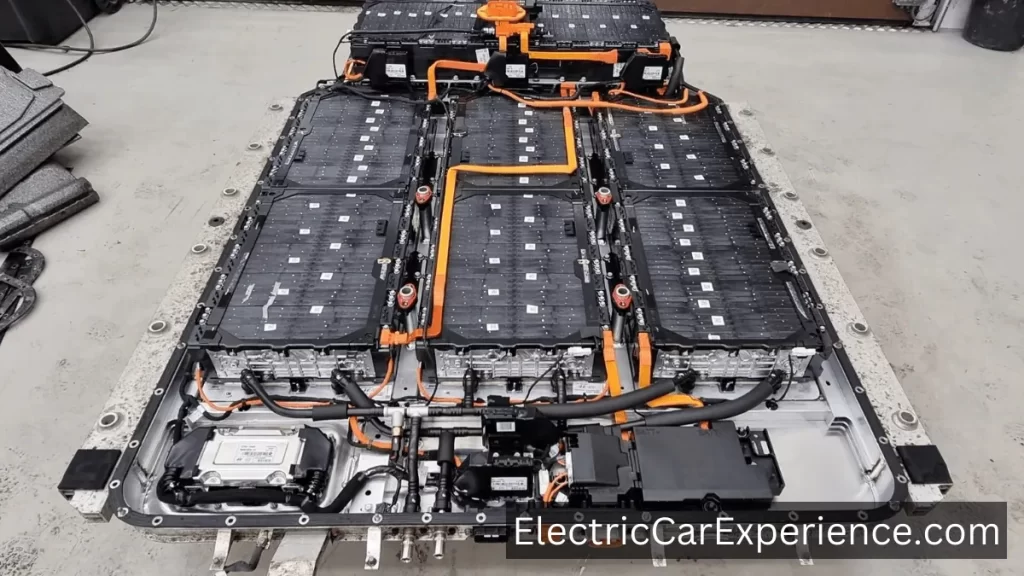
Kia Motors offers a comprehensive warranty for its electric vehicle (electric car) batteries. The battery warranty protects customers from the cost of any repairs or replacements needed due to manufacturing defects or other issues that arise during the battery’s life.
This warranty covers both new and certified pre-owned Kia electric car batteries for up to 8 years/100,000 miles. Kia Motors, the South Korean automaker, offers a comprehensive battery warranty for its electric vehicles (electric cars).
In this article, we will take a detailed look at the duration and terms of Kia’s electric car battery warranty, as well as other related aspects such as battery maintenance and care.
[toc]
Duration of Kia Electric Car Battery Warranty
Kia offers an impressive 8-year or 100,000-mile battery warranty for its electric cars, which is one of the longest in the industry.
This means that if the battery of your Kia electric car fails within 8 years or 100,000 miles (whichever comes first), Kia will repair or replace the battery at no cost to you.
It’s worth noting that the 8-year/100,000-mile battery warranty is a pro-rated warranty, which means that the coverage decreases over time.
For example, if the battery fails after 5 years and 50,000 miles, Kia will cover a percentage of the cost of repairing or replacing the battery. The exact percentage of coverage will depend on the age and mileage of the battery at the time of failure.
Aspects of Kia Electric Cars Battery Warranty
In addition to the duration and terms of the battery warranty, there are a few other important aspects to consider:
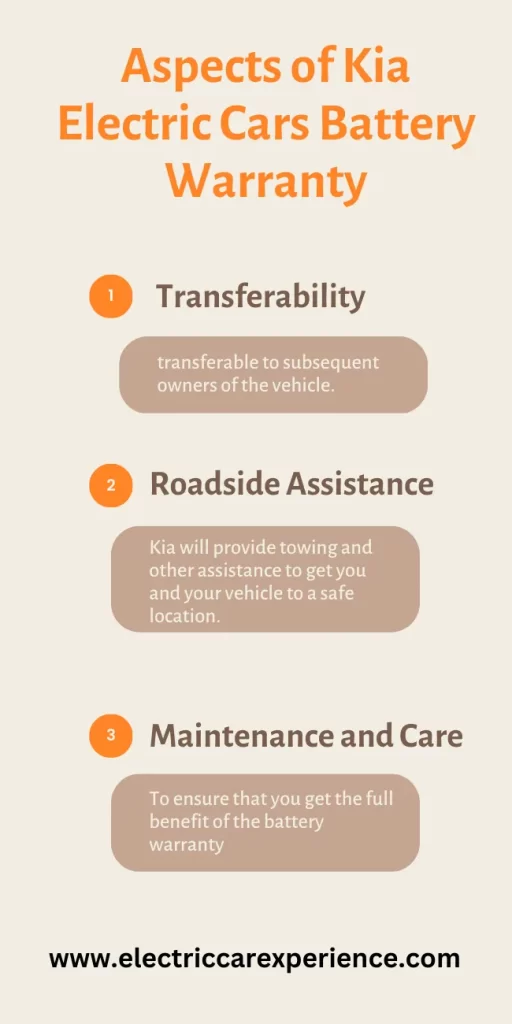
- Transferability
The Kia electric car battery warranty is transferable to subsequent owners of the vehicle. This means that if you sell your Kia electric car to someone else, the remaining coverage under the battery warranty will be transferred to the new owner.
- Roadside Assistance
Kia offers roadside assistance as part of the battery warranty for its electric cars. This means that if the battery of your Kia electric car fails while you are on the road, Kia will provide towing and other assistance to get you and your vehicle to a safe location.
- Maintenance and Care
To ensure that you get the full benefit of the battery warranty, it’s important to properly maintain and care for your Kia electric car’s battery.
This includes following the recommended charging and driving practices outlined in the owner’s manual, as well as having the battery and charging system inspected and maintained at regular intervals.
Benefits Of Kia Electric Car
An electric car battery warranty can provide peace of mind and financial protection for electric car owners.
With a comprehensive warranty like Kia’s 8-year/100,000-mile coverage, you can be confident that if something goes wrong with your battery, you will not be stuck with a huge repair bill.
In addition to the financial protection that an electric car battery warranty provides, it can also give you confidence in the overall quality and reliability of your electric car. A long warranty period is a sign that the manufacturer has faith in the durability and performance of their product.
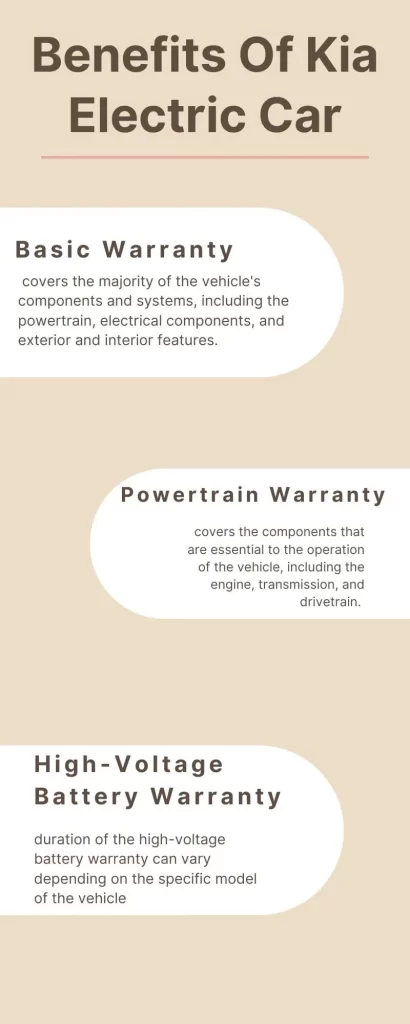
- Basic Warranty
The basic warranty covers the majority of the vehicle’s components and systems, including the powertrain, electrical components, and exterior and interior features. For Kia electric car models, the basic warranty is typically valid for a period of 5 years or 60,000 miles, whichever comes first.
- Powertrain Warranty
The powertrain warranty covers the components that are essential to the operation of the vehicle, including the engine, transmission, and drivetrain. For Kia electric car models, the powertrain warranty is typically valid for a period of 10 years or 100,000 miles, whichever comes first.
- High-Voltage Battery Warranty
The high-voltage battery is a crucial component of an electric vehicle, and Kia offers a separate warranty specifically for this component. The duration of the high-voltage battery warranty can vary depending on the specific model of the vehicle, but it is generally valid for a period of 8 years or 100,000 miles, whichever comes first.
Here is a table summarizing the duration of these warranties for Kia electric car models:
Warranty | Duration |
Basic Warranty | 5 years/60,000 miles |
Powertrain Warranty | 10 years/100,000 miles |
High-Voltage Battery Warranty | 8 years/100,000 miles |
It is important to note that these warranties may have certain
exclusions and limitations, and they may not cover all components or systems of
the vehicle. It is always a good idea to carefully review the terms and
conditions of the warranty before purchasing a Kia electric car to ensure that you understand the coverage provided.
The Importance Of Kia Electric Car Battery.
The battery is a crucial component of any electric vehicle (electric car). It stores the electrical energy that powers the motor and other systems in the vehicle. Without a reliable, long-lasting battery, an electric car would be impractical for everyday use.
That’s why Kia Motors, the South Korean automaker, offers a comprehensive battery warranty for its electric car. In this article, we have already discussed the duration and terms of Kia’s electric car battery warranty, as well as other related aspects such as maintenance and care.
In this section, we will delve deeper into the importance of electric car batteries and the role that they play in the overall performance and efficiency of an electric vehicle.
What Do Tweets Says About Kia Electric Car Battery?
- The new Kia EV6 comes with 3 year standard warranty
- Kia’s electric car and hybrid batteries come with an industry-leading warranty
- The Kia Soul EV
Battery Types and Technologies
There are a few different types of batteries that are commonly used in electric cars, each with its own set of characteristics and benefits. The most common types of batteries used in electric cars are:
- Lithium-ion (Li-ion) batteries: These are the most common type of battery used in electric cars. Li-ion batteries are lightweight, have a high energy density (meaning they can store a lot of energy in a small space), and have a relatively low self-discharge rate (meaning they don’t lose charge quickly when not in use).
- Nickel-metal hydride (NiMH) batteries: NiMH batteries are less common in electric cars than Li-ion batteries, but they are still used in some models. NiMH batteries are heavier and have a lower energy density than Li-ion batteries, but they are generally less expensive and have a longer lifespan.
- Lead-acid batteries: Lead-acid batteries are not commonly used in electric cars due to their low energy density and relatively short lifespan. They are, however, often used in hybrid electric cars (HEVs) as backup power source.
Battery Capacity and Range
One of the most important factors to consider when choosing an electric car is the battery capacity and the resulting range that the vehicle can achieve on a single charge. A larger battery capacity will generally result in a longer range, but it will also add weight and cost to the vehicle.
Most electric cars on the market today have a range of between 100 and 400 miles on a single charge, depending on the size of the battery and other factors such as the vehicle’s weight, aerodynamics, and power consumption.
Charging and Discharging Rates
Another important factor to consider when it comes to electric car batteries is the charging and discharging rates. The charging rate refers to the speed at which the battery can be recharged, while the discharging rate refers to the rate at which the battery can deliver power to the motor and other systems.
In general, electric cars with larger battery capacities will have slower charging and discharging rates, while smaller batteries will charge and discharge more quickly. The charging and discharging rates can also be affected by the type of battery and the charging equipment used.
Battery Maintenance and Care
Proper maintenance and care of an electric car battery are crucial to ensure its longevity and performance. Some simple steps that you can take to care for your electric car battery include:
- Follow the recommended charging and driving practices outlined in the owner’s manual.
- Avoid deep discharging the battery by using energy-intensive features sparingly and driving at moderate speeds.
- Keep the battery clean and free of debris.
How To Extend Battery Life?
The best way to extend the battery life of an electric car is to ensure that you are charging the battery correctly, using the recommended charging method for your specific model.
Additionally, driving at lower speeds and anticipating stops can help conserve energy and make your electric car last longer.
Ultimately, understanding how to manage battery life will ensure that you get the most out of your electric car.
There are several steps that you can take to extend the battery life of your electric vehicle (electric car):
Charge the battery regularly: It is important to keep the battery charged to avoid over-discharging, which can damage the battery. Try to charge the battery to at least 50% capacity at least once a week, and avoid letting the battery drop below 20% capacity if possible.
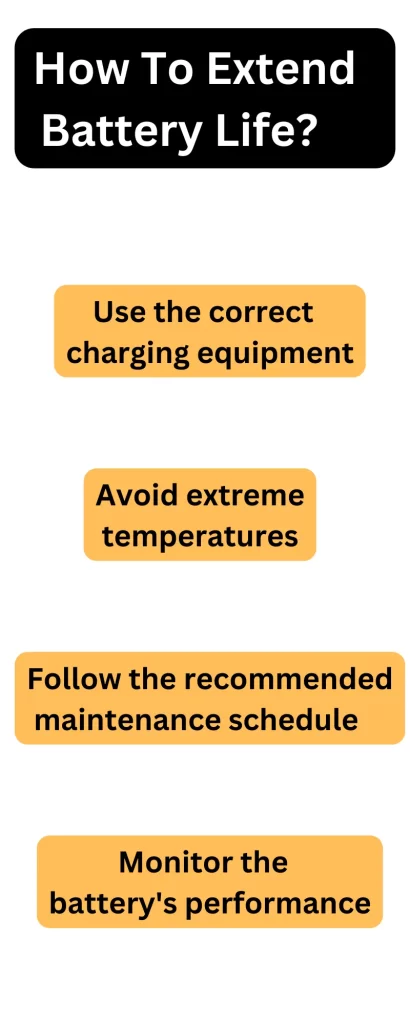
- Use the correct charging equipment: Make sure to use the charging equipment recommended by the manufacturer, as using the wrong equipment can damage the battery.
- Avoid extreme temperatures: Extreme temperatures can damage the battery, so it is important to avoid exposing the battery to very hot or cold temperatures. If possible, try to keep the battery at a moderate temperature, around room temperature.
- Follow the recommended maintenance schedule: Regular maintenance can help to extend the lifespan of the battery and the entire vehicle. Follow the recommended maintenance schedule to ensure that the battery and other components are in good condition.
- Monitor the battery’s performance: Keep an eye on the battery’s performance over time, and address any issues that may arise as soon as possible.
Why Do Electric Cars Last Longer?
Electric cars last longer than gas-powered vehicles because they are powered by motors and batteries, rather than complicated internal combustion engines that require frequent maintenance and repair.
Electric cars also benefit from the fact that electric motors produce fewer emissions, which can cause wear and tear on the engine.
Furthermore, electric cars require less energy to run, so their batteries last longer over time.
Electric vehicles (electric cars) are known for their long lifespan and low maintenance requirements, which can make them a cost-effective and reliable transportation option over the long term. There are several factors that contribute to the longevity of electric cars:
- Fewer moving parts: electric cars have fewer moving parts than internal combustion engine (ICE) vehicles, which means that there are fewer parts that can wear out or break down over time. This can reduce the need for maintenance and repairs, and it can extend the overall lifespan of the vehicle.
- No need for oil changes: electric cars do not have engines, so they do not require regular oil changes like ICE vehicles do. This can save time and money on maintenance, and it can also help to extend the lifespan of the vehicle.
- High-quality batteries: Modern electric cars are equipped with high-quality batteries that are designed to last for many years and miles. In general, electric car batteries are expected to retain at least 70% of their capacity after 8 years or 100,000 miles of use, although this can vary depending on the specific model of the vehicle.
- Proper use and maintenance: Proper use and maintenance can also help to extend the lifespan of an electric car. For example, avoiding extreme temperatures, using the correct charging equipment, and following the recommended maintenance schedule can all help to ensure that the vehicle remains in good condition over time.
Here is a table summarizing some of the key factors that contribute to the longevity of electric cars:
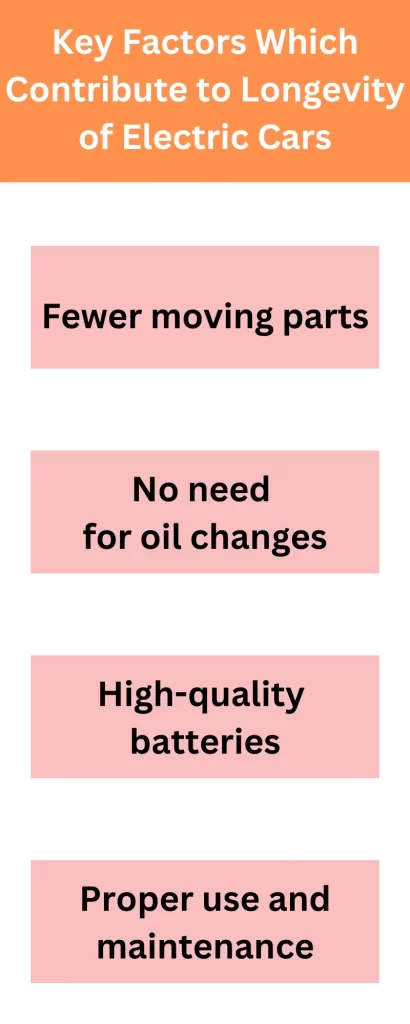
| Factor | Description |
| Fewer moving parts | electric cars have fewer parts that can wear out or break down over time, which can reduce the need for maintenance and repairs. |
| No need for oil changes | electric cars do not require regular oil changes like ICE vehicles do, which can save time and money on maintenance. |
| High-quality batteries | Modern electric cars are equipped with high-quality batteries that are designed to last for many years and miles. |
| Proper use and maintenance | Proper use and maintenance can help to extend the lifespan of an electric car by ensuring that it remains in good condition over time. |
How Long Do Electric Cars Batteries Last?
One of the concerns that many people have about electric cars is the lifespan of the battery.
While it’s difficult to provide a precise answer to this question, as it will depend on a variety of factors such as driving habits, climate, and maintenance, the good news is that electric car batteries are designed to last for many years.
In general, electric car batteries are built to last for at least 8 to 10 years, and often longer. Many electric car owners report that their batteries are still going strong after over a decade of use.
One factor that can affect the lifespan of an electric car battery is the amount of “deep discharging” that it undergoes.
Deep discharging occurs when the battery is discharged to a very low level, such as when driving at high speeds or using energy-intensive features like the air conditioning or heating.
Deep discharging can reduce the overall lifespan of the battery, so it’s important to try to avoid it whenever possible.
Battery Maintenance and Care
Proper maintenance and care can help to extend the lifespan of your Kia electric car battery and ensure that you get the full benefit of the 8-year/100,000-mile warranty. Here are a few tips for maintaining and caring for your electric car battery:
- Follow the recommended charging and driving practices outlined in the owner’s manual.
- Avoid deep discharging the battery by using energy-intensive features sparingly and driving at moderate speeds.
- Keep the battery clean and free of debris.
- Store the vehicle in a cool, dry place if it will not be used for an extended period of time.
- Have the battery and charging system inspected and maintained at regular intervals as recommended in the owner’s manual.
- Avoid leaving the battery in a fully discharged state for extended periods of time.
- If you do need to replace the battery, make sure to use a high-quality replacement battery from a reputable supplier.
Conclusion
Kia’s 8-year/100,000-mile battery warranty for its electric cars is one of the longest and most comprehensive in the industry.
In addition to the duration and terms of the warranty, Kia also offers transferability and roadside assistance, and encourages proper maintenance and care of the battery to ensure that you get the full benefit of the coverage.
With proper care and maintenance, your Kia electric cars battery should last for many years, providing reliable, cost-effective transportation for you and your family.
FAQs
What is the battery life expectancy in a Kia EV6?
According to current industry predictions, electric car batteries will endure between 100,000 and 200,000 miles or 15 to 20 years. Even if electric car batteries do age, the huge initial capacity paired with low capacity losses implies that the aging is nearly invisible to drivers.
How much does it cost to replace the battery in a Kia EV6?
Prices for a replacement automobile battery range from roughly $45 to $250, depending on power, size, and quality. Your local dealership, auto parts store, or automotive service center can inspect your present battery or provide you with a new car battery.
What is the hybrid battery warranty from Kia?
You can drive with confidence no matter what the road throws at you, thanks to Kia’s 10-year / 100,000-mile guarantee, which includes the EV6’s battery.
How much does a Kia electric car’s battery replacement cost?
Prices for a replacement car battery range from about $45 to $250 depending on power, size, and quality.
How long do electric car batteries last before needing to be replaced?
20 Years.
Posts Related to Electric Cars And Batteries.
- Why Tesla owner locked out of the car?-A complete guide 2024
- Internal Working of Electric Car Battery – Simplified-A complete guide 2024
- Does Radio Drain The Electric Car Battery?
- Can I Put A Bigger Battery In My Electric Car?
- How Cold Is Too Cold For Tesla Battery?
- Can a swollen car battery be fixed?
- Cheapest Electric Car Battery Replacement Cost
- Tesla Model s original battery condition after 10-year usage (20-year usage, 5-year usage, 2-year usage)
- Can Tesla Put More Batteries In The Front Trunk Of The Tesla Model S To Improve Range?
- Why China is working hard to control the resources used to make batteries for electric cars? An ultimate guide 2024
- Can’t Electric Cars Charge A Spare Battery and Replace It When The Main Battery is Over?
- How To Charge A Leisure Battery And How Long To Charge?
